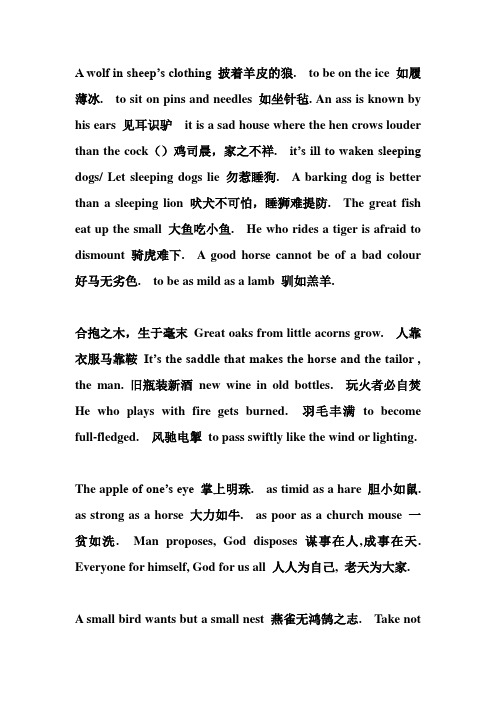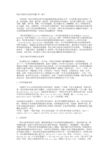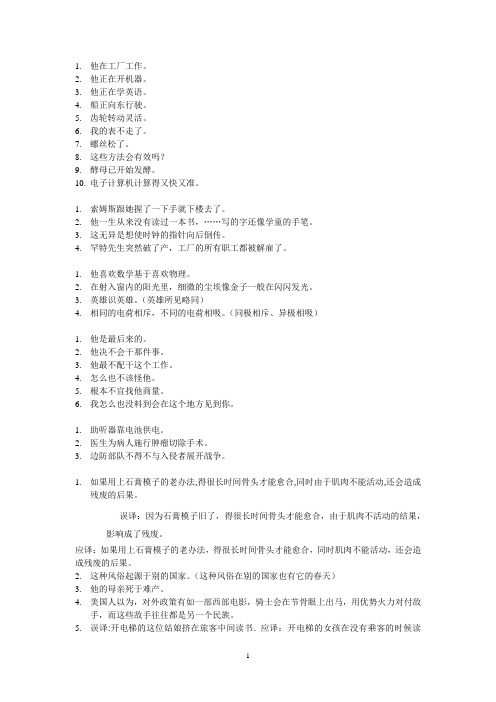英汉翻译10翻译难点之习语(1)
习语翻译(英汉)

的想法是正确的。
2. Like knows like.
三、习语的翻译方法
由于习语具有以上的
三 特点,翻译时就尽量保
习 语
持这些特点。这就要求
的 译者不仅要忠实表达原
翻 译
文习语的意义,还要尽
方 可能保持原文的丰富联
法 想,修辞效果以及民族
和地方特色。
习语不仅大量地出现在文 艺作品中和政治、科学论 文中,在口语中也会使用 一些习语,因此,习语的 翻译是一个非常重要的问 题,习语翻译的好坏对整 个译文的质量及听懂英语 口语都有直接的影响。
英语习语汉译主要有以下 三种方法:
1、直译法
三
这种方法是习语翻译的
习 很常用的一种方法。直译
语 (literal translation) 的字面
的 翻
意思就是“完全依照原文
译 翻译”。但直译法的运用,
方 法
必须遵循译文的语言规范,
1 不能引起错误的联想,要
尽可能地保留英语习语的
有时尽管汉语读者对 英语习语的比喻或典故 不太熟悉,但通过上下 文体现的西方民族色彩 或是政治色彩,可以使 汉语读者接受和理解, 而且经大量使用后,又 丰富了汉语语言。
三
英语习语大致可以分为
习 两类,一类是根据组成习
语 的
语的词汇字面意思而推知
翻 整个习语意义的,一类是
译 方
意义深奥或出自著名文学
法 作品,《圣经》,神话传
1 说或历史典故的。这两类
习语均可使用直译法。
例如 第一类中:
as easy as turning over one’s hand
a gentleman’s agreement A rolling stone gathers no
英汉习语翻译

A wolf in sheep’s clothing 披着羊皮的狼. to be on the ice 如履薄冰. to sit on pins and needles 如坐针毡. An ass is known by his ears 见耳识驴it is a sad house where the hen crows louder than the cock()鸡司晨,家之不祥. it’s ill to waken sleeping dogs/ Let sleeping dogs lie 勿惹睡狗. A barking dog is better than a sleeping lion 吠犬不可怕,睡狮难提防. The great fish eat up the small 大鱼吃小鱼. He who rides a tiger is afraid to dismount 骑虎难下. A good horse cannot be of a bad colour 好马无劣色. to be as mild as a lamb 驯如羔羊.合抱之木,生于毫末Great oaks from little acorns grow. 人靠衣服马靠鞍It’s the saddle that makes the horse and the tailor , the man. 旧瓶装新酒new wine in old bottles. 玩火者必自焚He who plays with fire gets burned. 羽毛丰满to become full-fledged. 风驰电掣to pass swiftly like the wind or lighting.The ap ple of one’s eye 掌上明珠. as timid as a hare 胆小如鼠. as strong as a horse 大力如牛. as poor as a church mouse 一贫如洗. Man proposes, God disposes 谋事在人,成事在天. Everyone for himself, God for us all 人人为自己, 老天为大家.A small bird wants but a small nest 燕雀无鸿鹄之志. Take notthe musket to kill a butterfly 杀鸡焉用牛刀. When the cat’s away, the mice will play 山中无老虎,猴子称霸王. You can’t sell the cow and drink the milk 鱼与熊掌不可兼得. Beat the dog before a lion 杀鸡给猴看Love me, love my dog 爱屋及乌. Better be the head of a dog than the tail of lion 宁为鸡口,不为牛后. He killed the goose that laid the golden eggs 杀鸡取卵.A baited cat may grow as fierce as a lion 狗急跳墙. Carrion crows bewail the dead sheep, and then eat them 猫哭耗子假慈悲. castle in the air 空中楼阁. a bolt from the blue 晴天霹雳. six of one and half a dozen of the other 半斤八两. after one’s own heart 正中下怀. kill two birds with one stone 一箭双雕. show the cloven hoof 露出马脚. fish in the air 水中捞月. kick down the ladder 过河拆桥. between the devil and the deep sea 进退维谷.To draw one’s blood 伤人感情,惹人生气. to hang o n sb’s sleeve 依赖某人. to hang on one’s lips 对某人言听计从. to make a monkey of sb 愚弄某人. to bend an ear to 倾听,聚精会神地听. to bury one’s head in the sand 采取鸵鸟政策. to have an axe to grind 别有用心. to talk through one’s hat 胡言乱语. to leave no stone unturned 千方百计不遗余力. to call a spade a spade 直言不讳. to pull one’s leg 愚弄某人,开某人的玩笑. to eat one’s words 被迫收回前言,承认自己说了错话. to be full of beans 精力旺盛,精力充沛. to be like square pegs in round holes 格格不入. a skeleton in the feast 扫兴的人或事物. a fly in the ointment美中不足. with a grain of salt 半信半疑. with one’s tongue in the one’s cheek 说说而已,非诚心诚意.扬眉吐气to feel proud and elated. 灯红酒绿to be dissipated and luxurious. 开门见山to come straight to a point . 单枪匹马to be single-handed in doing sth. 大张旗鼓on a large spectacular scale. 风雨飘摇(of a situation)being unstable. 胸有成竹to have a well-thought-out plan before doing sth. 海阔天空(to talk) at random.四面楚歌to be besieged on all sides. 毛遂自荐to volunteer one’s service. 初出茅庐at the beginning of one’s career. 倾城倾国to be exceedingly beautiful. 罄竹难书(of crimes )too numerous to mention.To spend money like water 花钱如流水/挥金如土. to spring up like mushrooms 如雨后春笋般出现. a stony heart 铁石心肠. at one’s fingertips 了如指掌. to have a hand like a foot 笨手笨脚. as mute as a fish 噤若寒蝉. to shut one’s eyes against to 视若无睹. return good for evil 以德报怨. to turn a deaf ear to充耳不闻. Practice makes perfect 熟能生巧. to face the music 临危不惧. plain sailing 一帆风顺. at sixes and sevens 乱七八糟. to be dead drunk 烂醉如泥. laugh and grow fat 心宽体胖. to fly into a rage 勃然大怒. to look for a needle in a haystack 海底捞针. a leap in the dark 轻举妄动. to show one’s colors 原形毕露. to make a noise in the world 名噪一时More haste, less speed 欲速则不达. neither fish nor flesh 不伦不类. to pick holes in 吹毛求疵. to mind one’s P’s and Q’s 谨言慎行. to be at the end of one’s rope 山穷水尽. to log a dead horse 徒劳无益. to turn over a new deaf 改过自新to put all one’s egg in one basket 孤注一掷. to take French leave 擅自离开. Out of sight, out of mind 久离情疏. to hold the purse string 掌握经济大权. to have forty winks 迷糊了一会儿. to talk black into white 颠倒黑白. to give sb’s the green light 给某人开绿灯. to be armed to the teeth 武装到牙齿. to laugh off one’s head 笑掉牙齿. to be out at elbows 捉襟见肘. to be born with a silver spoon in one’s mouth 生在富贵人家. A rolling stone gather no moss 滚石不生苔.英雄所见略同Great minds think alike. 祸不单行Misfortunes never come alone. 隔篱有眼,隔墙有耳Hedges have eyes, andwalls have ears. 时不待我,岁月无情Time and tide wait for no man. 少壮不努力,老大徒伤悲A young idler, an old beggar. 健康胜于财富Health is better than wealth. 无官一身轻Out of office, out of danger. 居安思危In time of peace prepare for war. 前事不忘,后事之师/前车之覆,后车之鉴The remembrance of the past is the teacher of the future. 吃一堑,长一智 A fall into the pit, a gain in your wit. 新官上任三把火A new broom sweeps clean. 杀鸡儆猴beat the dog before the lion. 班门弄斧teach fish to swim. 一言既出,驷马难追 A word spoken is past recalling. 一朝怕蛇咬,十年怕井绳Once bit, twice shy . 物以类聚,人以群分Birds of a feather flock together. 无风不起浪There is no smoke without fire. 本末倒置put the cart before the horse. 佛要金装,人要衣装Fine feathers make fine birds. 得寸进尺Much will have more. 喧宾夺主The sauce is better than the fish. 挂羊头,卖狗肉He cries wine and sells vinegar 青出于蓝而胜于蓝The pupil outdoes the master. 天涯何处无芳草There are plenty of fish in the sea. 棋逢对手Diamond cut diamond. 拿了收短,吃了嘴软Gifts blind the eye 天下乌鸦一般黑Dogs bite in every country. 滴水穿石Little strokes fell great oaks. 条条大路通罗马All roads lead to Rome. 百川入海,殊途同归All rivers run into the sea. 口蜜腹剑Peace on the forehead and war in themind. 身正不怕影子斜 A straight foot is not afraid of a crooked shoe. 宁为玉碎,不为瓦全It is better to die with honor than to live with shame. 醉翁之意不在酒Many kiss the baby for the nurse’s sake. 不入虎穴,焉得虎子Nothing venture, nothing have. 入乡随俗Do in the Rome as the Romans do. 木已成舟/覆水难收Things done cannot be done. 为人不做亏心事,半夜不怕鬼敲门 A clear conscience is a sure card . 做贼心虚A bad conscience is a snake in one’s heart . 事与愿违All your swans are geese. 天网恢恢,疏而不漏Justice has long arms. 君子之交淡如水A hedge between friendship green. 大智若愚He knows most who speaks least/Still water runs deep. 自食其果As you make the bed, so you must lie in it. 盲目乐观count one’s chickens before they are hatched. 一失足成千古横Short pleasure, long lament. 若要人不知,除非己莫为What is done by night appears by day. 患难与共/有福同享,有难同当stick together through thick and thin. 江山易改,本性难移 A leopard(豹子)cannot change its spots/You cannot make a crab walk straight. 随遇而安Don’t trouble trouble until trouble troubles you. 天有不测风云,人有旦夕祸福Accidents will happen/Every tide has its ebb. 智者千虑,必有一失The best horse stumbles. 罗马并不是一日建成Rome was not built in a day. 留得青山在,不愁没柴烧The shepherdwould rather lose the wool than the sheep. 小小漏洞沉默大船A little leak will sink a great ship. 心急吃不了热豆腐 A watched pot never boils.。
英汉习语的文化差异及翻译.doc

英汉习语的文化差异及翻译--张宁习语是某一语言在使用过程中形成的独特的固定的表达方式。
本文所要讨论的习语是广义的、包括成语、谚语、歇后语、典故等。
英汉两种语言历史悠久,包含着大量的习语,它们或含蓄、幽默、或严肃、典雅,不仅言简意赅,而且形象生动,妙趣横和,给人一种美的享受。
由于地理、历史、宗教信仰、生活习俗等方面的差异,英汉习语承载着不民的民族文化特色和文化信息,它们与文化传统紧密相连,不可分割。
习语中的文化因素往往是翻译中的难点。
本文试图借助语用学的理论,对英汉习语的翻译作一些探索。
美车哲学教授H.P.Grice在他的Meaning一书中把话语的意义分为自然意义(natural meaning)和非自然意义(non-natural meaning)两种。
话语的非自然意义指人们意欲表达的意义,即在特定的场合下表达出交际者意图的语用隐含意义。
这就是Grice的会话含意(conversational implicature)理论的基础。
那么,由于英汉两种语言的文化背景的差异,同样字面意义、形象意义的话语文章可能具有完全不同的隐含意义。
隐含意义才是说话人或作者所要表达的意义。
根据我们的观察,英汉习语之间的多方面差异可归为两类:一是形象意义的差异,一是隐含意义(包括褒贬义)的差异,而它们都是字面以外的意义,是文化差异的具体反映。
由此出发,本文提出了英汉习语文化意义翻译的具体原则和方法。
一、英汉习语中所反映的文化差异朱光潜先生在《谈翻译》一文中说:“外国文学最难了解和翻译的第一是联想的意义……”,“它带有特殊的情感氛围,甚深广而微妙,在字典中无从找出,对文学却极要紧。
如果我们不熟悉一国的人情风俗和文化历史背景,对于文字的这种意义就茫然,尤其是在翻译时这种字义最不易应付。
”英国文化人类学家爱德华·泰勒在《原始文化》(1871)一书中,首次把文化作为一个概念提了出来,并表述为:“文化是一种复杂,它包括知识、信仰、艺术、道德、法律、风俗以及其作社会上习得的能力与习惯。
英语翻译练习

]《中国人最容易犯的英汉翻译错误》-1一个词变成一个句著名翻译家奈达说,“翻译就是翻译意思”。
言外之意,翻译一句话不能逐一翻译一串个别的单词,也不是翻译某种句子结构。
初学翻译的人之所以译得不好,就是因为摆脱不了原文各个单词和句子结构的影响,总觉得英语中每一个词译成汉语都是一个词。
殊不知,为了说明原文的意思,有时候要将一个词译成几个词,乃至一个短句。
这就是翻译中对某些词的…增益‟。
例如,英语中有些单词相当于汉语的一个词组:read“看书”,drive“开车”,giggle“咯咯地笑”,s tumble“蹒跚而行”,等等。
这些相对而言还比较简单,一般英汉词典上都能查得到。
再如,英语句子中有大量的“副词+动词”的结构(副词也可能在动词之后)。
在不少情况下这种结构可以译成汉语“副词+动词”的偏正结构(汉语中副词修饰动词时只能放在动词之前),许多人往往用“……地”来译所有的英语副词,如:(1)T hey were patiently lis tening to him. 他们在耐心地听他讲。
(2)He quickly s tood up. 他很快地站起来。
(3)I will gladly join you in the work. 我会乐意地和你一起工作。
这三句中都用了“地”字结构,第一句还可以,后两句就显得有点“翻译腔”,“地”字似乎可以省去,可分别改译为:“他很快站起来”和“我乐意和你一起工作”。
但是这三句中的副词和动词仍然译成了偏正结构,这是因为三句中的副词表示的是动作的方式。
但是,是不是英语中所有的这种结构都可以这么译呢?请大家考虑一下下面这一句应如何翻译:T his is a NATO matter and any comment on it s hould appropriately come from NATO.将appropriately come from NATO译成“合适地来自北约”显然不通。
英汉习语翻译

1. 固定性
特征之一是结构固定性。它是“约定俗成” 的产物,一经定型就有了一个规范的固定的 形式,如果加以变更,只会造成语言使用上 的混乱。而且,改变了成分和结构关系,还 会造成词义上的混乱,其结构固定性表明英 语习语不可随意改变它的结构。
1) 不可随便在其中增加词或减少词,如 live from hand to mouth不能写成live from the hand to the mouth, 糊口度日;现挣现吃;收入勉强糊口;紧能 满足眼前的需要(尤指食物方面) fish out of water 不能写成fish out of the water, 它总是以固定形式出现。 如鱼离水;离水之鱼,不得其所
(2)keep one’s powder dry (保持火 药干燥) 出自十七世纪,英国独裁政客奥利弗· 克伦威 尔(Oliver Cromwell)出征爱尔兰,渡河 攻击前对部队说“Put your trust in God; but be sure to keep your powder dry。”(笃信上帝,但不要忘记,保持火 药干燥)现用来指“做好准备”、“有备无 患”。
(3) A dog in the manger 源于《伊索寓言》,说的是一条狗一天睡在 放有稻草的马槽里,狗是不吃草的动物,而 当马或牛一走进稻草时,这条狗却朝着马或 牛狂吠,不准食草动物享用。该习语用来讽 刺那些占据着职位却不做事的人或那些自私 的人占有某些东西,却不使用,又不肯与人 分享。
3. 源于圣经
《圣经》塑造了西方人的价值观和伦理,要 了解西方文明,就得去读《圣经》。有人统 计,当今世界大约有10亿人把圣经当成他们 的精神食粮。因此,英语语言中有不少习语 来自《圣经》。
(1)Separate the sheep from the goats
习语翻译

① 有眼不识泰山
② 有眼无珠
Tom, Dick and Harry ① 张三,李四,王二麻子 ② 阿猫阿狗 ③ 普通的人 / 任何人
Two heads are better than one. ① 三个臭皮匠赛过诸葛亮。 ② 人多出韩信。 ③两个脑袋总比一个脑袋强。
④ 两人智慧胜一人。/ 一人不及两人智。
eat ones words
误译 :食言;失信 原义:admit to having said something wrong 承认自己说错了话 child’s play 误译:儿戏 原义:thing that is very easy to do 容易做的事 touch-and-go 误译:一触即发 原义:uncertain as to the result 无法确定的结果
I Love You Enough!
“You don’t love me!” How many times have your kids laid that one on you? And how many times have you, as a parent, resisted the urge to tell them how much? Someday, when my children are old enough to understand the logic that motivates a mother, I’ll tell them. I loved you enough to bug you about where you were going, with whom, and what time you would go home. I loved you enough to say, “Yes, you can go to Disney World on Mother’s day. ” I loved you enough to let you see anger, disappointment ,disgust and tears in my eyes. I loved you enough not to make excuses for your lack of respect or your bad manners. I loved you enough to admit that I was wrong and ask your forgiveness. I loved you enough to ignore “what every other mother ”did or said. I loved you enough to let you stumble, fall, hurt and fail. I loved you enough to let you assume the responsibility for your own actions, at six, ten or sixteen. I loved you enough to figure you would lie about the party being chaperoned, but forgave you for it… after discovering I was right. I loved you enough to shove you off my lap, let go of your hand, be mute to your pleas… so that you had to stand alone. I loved you enough to accept you for what you are, not what I wanted you to be. But most of all, I loved you enough to say no when you hated me for it. That was the hardest part of all.
英汉翻译技巧练习I(key)

1.他在工厂工作。
2.他正在开机器。
3.他正在学英语。
4.船正向东行驶。
5.齿轮转动灵活。
6.我的表不走了。
7.螺丝松了。
8.这些方法会有效吗?9.酵母已开始发酵。
10.电子计算机计算得又快又准。
1.索姆斯跟她握了一下手就下楼去了。
2.他一生从来没有读过一本书,……写的字还像学童的手笔。
3.这无异是想使时钟的指针向后倒传。
4.罕特先生突然破了产,工厂的所有职工都被解雇了。
1.他喜欢数学基于喜欢物理。
2.在射入窗内的阳光里,细微的尘埃像金子一般在闪闪发光。
3.英雄识英雄。
(英雄所见略同)4.相同的电荷相斥,不同的电荷相吸。
(同极相斥、异极相吸)1.他是最后来的。
2.他决不会干那件事。
3.他最不配干这个工作。
4.怎么也不该怪他。
5.根本不宜找他商量。
6.我怎么也没料到会在这个地方见到你。
1.助听器靠电池供电。
2.医生为病人施行肿瘤切除手术。
3.边防部队不得不与入侵者展开战争。
1.如果用上石膏模子的老办法,得很长时间骨头才能愈合,同时由于肌肉不能活动,还会造成残废的后果。
误译:因为石膏模子旧了,得很长时间骨头才能愈合,由于肌肉不活动的结果,影响成了残废。
应译:如果用上石膏模子的老办法,得很长时间骨头才能愈合,同时肌肉不能活动,还会造成残废的后果。
2.这种风俗起源于别的国家。
(这种风俗在别的国家也有它的春天)3.他的母亲死于难产。
4.美国人以为,对外政策有如一部西部电影,骑士会在节骨眼上出马,用优势火力对付敌手,而这些敌手往往都是另一个民族。
5.误译:开电梯的这位姑娘挤在旅客中间读书. 应译:开电梯的女孩在没有乘客的时候读书。
6.不要一意孤行.否则, 你会遭到失败的.词义的褒贬2.论褒贬,即要注意同义词之间有不同的语体色彩、使用范围及程度。
任何语言都有语体之分,有高雅的,通俗的,粗野的,还有俚语,公文用语及术语等。
文学作品中,作家通过不同的语体来刻画人物的性格特征,更是常用的方法。
翻译时,必须审其雅俗,量其轻重,这样,才能恰如其分地表达原文的精神。
英汉习语的翻译

摘要:英汉两种语言都拥有大量的习语。
习语有的意思明显,有的含蓄。
译者除了忠实地表达原文习语的意义外,还要尽可能保持原文习语的语言风格。
因此,习语的翻译是比较困难的。
但习语翻译的好坏对整个译文的质量有直接的影响。
因此,如何处理习语是翻译中的一个极为重要的问题。
关键词:英语习语;汉语习语;翻译学习任何语言,包括母语在内,均不能忽略习语。
英语和汉语是两种高度发展的语言,因而都拥有大量的习语。
习语是经过长时间的沿习使用而提练出来的固定词组或短句,是人民智慧的结晶。
习语大都具有鲜明的形象,形式简练,含义精辟,表达生动等等特点,为人们所喜闻乐用,广泛流传,因而往往带有浓厚的民族色彩和地方色彩。
习语有的意思明显;有的富于含蓄,意在言外,可引起丰富的联想;有的可能包含几个意义,必须根据上下文的具体情况来明确它的意义。
习语既是语言中的重要修辞手段,同时其本身也是各种修辞手段的集中表现。
不少习语前后对称,韵律协调。
由于习语具有这些特点,翻译时就应当尽量保持这些特点。
翻译时除了忠实地表达原文习语的意义外,还应尽可能保持原文的形象比喻、丰富联想、修辞效果以及其民族、地方特色等,避免死译硬译。
习语不仅大量出现在文艺作品里,在政治和科学学论文中也同样经常遇到。
习语翻译的好坏对整个译文的质量有直接的影响。
一、英语习语的汉译英语习语以其精辟、形象、生动等特点,牢固地确立了它在英语中的重要地位。
无论是在书面语言中,还是口头语言里,英语习语都发挥着越来越重要的作用,其数量正在日益扩大、其质量也在不断升华。
要想译好英语习语,仅借助于一本字典或是认识几个单词是远远不够的,我们必须打好扎实的语言基本功,掌握英语习语的词汇构成和丰富的习语知识,通过长期不懈的学习和实践。
英语习语的汉译主要有以下几种方法:(一)直译法有些英语习语是平铺直叙的,既无很深的含义,也无难解的典故,只是用词与搭配相对地固定。
对这类习语,我们只须从字面上去理解,采取直译的方法:last but not least 最后但不是最不重要的一点under one’s nose 在某人鼻子底下to break the record 打破记录laugh in one’s face 当面嘲笑lay sth to heart 把某事放在心上have pity on sb 同情某人to fight to the last man 战斗到最后一个人有些英语习语,有着明显的比喻意义,其中不少有着一定的历史或神话典故。
- 1、下载文档前请自行甄别文档内容的完整性,平台不提供额外的编辑、内容补充、找答案等附加服务。
- 2、"仅部分预览"的文档,不可在线预览部分如存在完整性等问题,可反馈申请退款(可完整预览的文档不适用该条件!)。
- 3、如文档侵犯您的权益,请联系客服反馈,我们会尽快为您处理(人工客服工作时间:9:00-18:30)。
(13)strike while the iron is hot 趁热打铁。 Father is in a good mood at the moment.Strike while th e iron is hot and ask him to let you go to the circus. 这时父亲的情绪很好,乘此机会求他让你去看马戏。 (14)there‟s no smoke without fire 无火不冒烟;无风不 起浪。 The story is all over the town. It is being spread by some one or by some people. There‟s no smoke without fire. 这个传说遍及全城,有人或有些人还在散布。真是无火不 冒烟。 (15)a thorn in the flesh (side)肉中刺;棘手的事, 不断使某人烦恼的根源。 The memory of this act will be a thorn in the flesh for the rest of your life,my boy. 这种行动会使你不断引起回忆。使你终生烦恼,我的朋 友。
3.This is a dangerous and violent city. In some parts of it, the only law is the law of the jungle. 误译:这是一个危险的充满暴力的城市。在有些 地方,惟一的原则就是森林法则。 应译为:这是一个危险的充满暴力的城市。在有 些地方,惟一的原则就是弱肉强食。 这里“the law of the jungle”引申为 “principles for surviving in a violent and dangerou s situation, no rules at all”,如译为“森林法则”, 则含义不明。“弱肉强食”才是准确、明了地传达 了原文所要表达的意义。
Chapter 4 Difficult Points of Translation
Translation of Idioms
习语是人们长期沿用的固定词组或短语,它历 经岁月的锤炼,具有短小精悍,结构严谨,形式 简练,意味隽永等特征,为人们广泛使用在文学 艺术和日常生活中.
习语翻译的特点---复杂性
(3) 英语成语的复杂性还表现在运用时的相对灵活性. 虽说有些成语形式相当稳定,如不能把”Diamond cut diamond, crook cut crook”中的cut 加s,也不能将 black sheep改成black horse,但有些成语运用的相 当灵活.一句话可以凝缩成短语, 几个字,甚至是改头 换面.如 It‟s no good crying over spilt milk这条成语 就 产 生 了 许 多 变 体 . 如 crying over spilt milk, weeping for shed milk, crying for milk, crying after milk, spilt milk, shed milk等.
(4)(that is) easier said than done 说起来容易做起来 难。 Easier said than done, let‟s pay more attention to practice. 说起来容易做起来难,让我们多注意些实践吧! (5)fish in troubled waters 混水摸鱼,乘人之危。 He‟s always been good at fishing in troubled waters; he made a lot of money by buying houses that were bombed in the war. 他总是善于乘人之危大捞一把,他靠购买在战争中遭 过轰炸的房屋而赚了大量的钱财。 (6)fish out of water 离水之鱼,不得其所。 She felt like a fish out of water at the evening party because she knew no one. 她在晚会上感到很局促,因为她一个人也不认识。
4. When my ship comes in, take a trip to Casablanca.
(1)英汉两文化的巨大差异. 英汉两族所经社会形态基本相似,但在此期间 所发生的历史事件与特定的传统沿革,地理环 境,风俗习惯和心理状态相互交织构成了特定 的文化氛围.这种文化氛围和给语言深深打上 了烙印,构成了语言和成语独特的民族特色.
(2) 成语自身构成的复杂性. 成语作为一种独特的语言现象具有独特性,即 意义上的独立性和固定性.也就是说成语的意 义并非是它组成单字的总和,不能从字面上来 猜测它的意思.如”claw me and I‟ll claw thee”这一成语表面上是”以眼还眼,以牙还牙” 之意.但这与其真正含义”praise me and I‟ll praise you”相去甚远.这一特殊性,无疑增加了 成语翻译的难度.
2.The changes in the education system are a step in the right direction and will improve the teaching in our school. 误译:教育体制改革朝着正确的方向迈进了 一步,它将改进我们学校的教学。 应译为:教育体制改革是一个有效的措施, 它将改进我们学校的教学。 这里“a step in the right direction”用来比喻 “an action which helps to improve a situation ”,即“有效步骤或措施”。如果是将其直译, 就没有反映出“有效”这个表达结果的含义。
可以直译的
有相当一部分英语成语和汉语里的成语或词 组相通,其用法和表达方式几乎完全一样, 可以逐词对译出来;这类成语比较容易为我 们所接受,特别适合于初涉英语成语的学 习。
(1)bad egg 坏蛋,歹徒。 Trust him nothing;he is a bad egg。别信他, 他是个坏蛋。 (2)crocodile tears 鳄鱼的眼泪,假慈悲。 Don‟t weep crocodile tears with his misfortune. I know you have always detested him and are only too happy to see him get into trouble。 别假惺惺地为他的不幸难过了,我知道你一直讨 厌他,看到他倒霉,心里可高兴哩! (3)cry wolf 呼喊“狼来了”,发假情报。 That politician cries wolf in every speech he makes. 那个政治家在他的每篇演说中都发假警报。
容汉语思 想编码去交换,在一定的语境中也好像说得 通,但在这样的理解基础上去翻译它们,却 不能准确传达原文的含义,因此误译也就在 所难免。这些容易导致我们“想当然”的英 语惯用语,可大致归为以下几类。
一.有些英语惯用语表达的真正含义是其比喻义或引 申义,如果只将其字面意义直译出来,就可能产生 误译。 1. In a flash the evil intent of the vice-president to usurp power hit the president between the eyes. 误译:一刹那间,副总统篡权的罪恶意图给总统当 头一棒。 应译为:一刹那间,总统明白了副总统篡权的罪恶 意图。 这里“to hit someone between the eyes”,为 “to strike someone (metaphorically speaking)”, 喻义为“使人忽然了解,使人猛然明白”。而汉语 中“给某人当头一棒”,却无此意。
但英语成语中有相当一部分来自古籍和神话,妄加推 测已不可能.如 “apple of Sodom”出自《圣经》,讲 的是上帝为惩罚所多玛这一臭名昭著的城市,降火毁 灭了该城.此后,该地盛产味道鲜美的苹果也起了变 化,只要苹果从树上掉下来,马上化为灰烬.因而用 “所多玛的苹果”来形容华而不实的东西,意为 “金玉其外,败絮其中”.再如Pandora’s box则来自 希腊神话.Under the rose译自拉丁文.古代罗马人用 玫瑰来做保持沉默和保守秘密的标志(神话中说道爱 神丘比特送给沉默的神哈波克雷特一朵玫瑰,要他为 维纳斯女神保守秘密),甚至把它雕刻在餐厅的天花板 上以示警戒.Blow one’s own trumpet则起源于战争 和军事生活.
(10)lose face 丢脸;失面子。 Certain country often loses face in regard to its relations with small weak countries on account of its dirty tricks. 某个国家在与弱小国家交往中因其使用卑鄙手段 而总是丢脸。 (11)odds and ends 零零碎碎。 What shall we do with all those odds and ends? 我们用那些残余的东西可做什么呢? (12)play with fire 玩火,作无谓而危险的事。 He who plays with fire gets burned.玩火者必自 焚。
(7)gives someone an inch and he will take an ell 得寸进 尺。 If you give those people an inch, they‟ll take an ell; we told them they might use our side path to reach their garden, now they have fenced in the path so that we cannot use it ourselves. 那些人就是得寸进尺;我们对他们说,他们可以经过我们的 小道进他们的花园,现在他们已在小道上修起了篱笆,以致 我们自己也无法走这条小路过去了。 (8)go west 上西天,死,失败。 Poor John was one of those who went west in the explosion 可怜的约翰是在这次爆炸中魂归西天的人物之一。 (9)in a word 一句话,简而言之 I have no time to tell you the whole story, in a word, they become hostile to each other。 我没时间把全部经过告诉你,一句话,他们相互成了仇敌。
